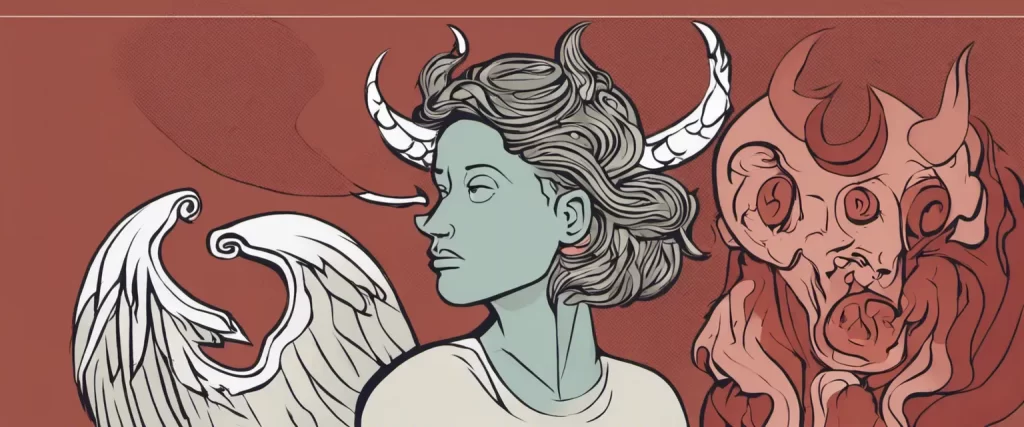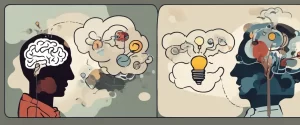——The Lucifer Effect by Philip Zimbardo & The Death of Expertise by Thomas M. Nichols
In today’s era of information overload and rampant skepticism towards expert opinions, it is crucial to delve into the underlying causes and ramifications of these societal shifts. Two influential works that shed light on the vast complexities underlying human behavior and our relationship with authoritative knowledge are “The Lucifer Effect” by Philip Zimbardo and “The Death of Expertise” by Thomas M. Nichols. Through their distinct yet complementary perspectives, Zimbardo and Nichols unravel the intricacies of power, authority, and the erosion of expertise in our modern world.
In “The Lucifer Effect,” renowned psychologist Philip Zimbardo explores the darkest corners of human nature through his groundbreaking Stanford Prison Experiment. Zimbardo challenges our conventional understanding of good and evil, illustrating how ordinary individuals can be effortlessly swayed to commit heinous acts under the influence of situational forces. By delving into the psychology of power and submission, he forces us to question our inherent assumptions about human morality and the boundaries that separate right from wrong. Zimbardo’s work possesses a gripping narrative that invites readers to grapple with uncomfortable truths about the potential for evil within each of us.
On the other hand, Thomas M. Nichols in “The Death of Expertise” investigates a more recent societal phenomenon—the dismissal of expertise and the rise of anti-intellectualism. In a time when opinions reign supreme and misinformation spreads like wildfire, Nichols delves into the consequences of a society that increasingly rejects authority and undermines the value of knowledge and experience. Drawing on historical precedents, he argues that the erosion of expertise not only jeopardizes our democracy but also hinders progress and critical decision-making in various domains. Nichols offers a compelling critique of the challenges faced by experts in today’s climate and highlights the urgent need for informed and respectful public discourse.
As these two seminal works intersect at distinct junctures, it becomes apparent that Zimbardo and Nichols offer comprehensive insights into different aspects of our societal fabric. While Zimbardo uncovers the malleability of human behavior with an emphasis on individual accountability, Nichols examines how the death of expertise emerges as a collective failure undermining the foundations of our democratic system. By juxtaposing their respective lenses, we hope to gain a deeper understanding of the complex interplay between human psychology, power dynamics, and the erosion of expertise within the broader context of society.
Through this comparative study, we aim to bridge the gap between these valuable contributions, analyzing the common threads and divergence in their approaches and finding common ground to better comprehend the multifaceted challenges we face. As we venture into the pages of these formidable works, we embark on a journey of introspection and critical analysis that can inspire necessary conversations about our own individual actions and collective responsibilities in shaping a more informed and civilized society.
Brief Summary of Two Books
The Lucifer Effect by Philip Zimbardo
“The Lucifer Effect” by Philip Zimbardo explores the dark side of human behavior and examines the psychological factors that can lead ordinary individuals to engage in evil acts. The book primarily focuses on the infamous Stanford Prison Experiment conducted by Zimbardo himself in 1971, where ordinary college students were randomly assigned roles as prisoners and guards in a simulated prison environment.
Zimbardo delves into the gradual transformation of the participants, as the guards progressively became more sadistic and abusive, and the prisoners endured severe distress and psychological trauma. Through this experiment and various real-world examples, including the atrocities committed by American soldiers in the Abu Ghraib prison in Iraq, Zimbardo showcases how situational factors can corrupt individual morality and prompt ordinary individuals to commit acts of cruelty.
In addition to dissecting the Stanford Prison Experiment, Zimbardo explores the influence of systemic factors such as social institutions, power dynamics, and deindividuation on human behavior. He argues that under certain circumstances, even virtuous individuals are susceptible to conforming to group norms, engaging in acts of violence, and losing their moral compass.
Ultimately, “The Lucifer Effect” serves as a cautionary tale, highlighting the importance of recognizing the situational forces that can shape human behavior. It emphasizes the need for increased awareness, institutional reforms, and ethical decision-making to prevent the descent into evil and promote empathy, compassion, and justice in society.
The Death of Expertise by Thomas M. Nichols
“The Death of Expertise” by Thomas M. Nichols explores the current rise in anti-intellectualism and the erosion of trust in experts. Nichols argues that in today’s society, people are increasingly dismissing expert opinions, knowledge, and facts in favor of their own beliefs and emotions. This trend, he suggests, is fueled by a combination of factors, including the access to vast amounts of information on the internet, the rejection of authority figures, and the promotion of an “everyone’s opinion is equal” mentality.
Through various examples and case studies, Nichols highlights the dangerous implications of this rejection of expertise. He discusses how it impacts public policy decisions, such as climate change, education, and healthcare, and how it undermines the scientific method and critical thinking. Nichols also delves into the role of social media and technology in exacerbating this problem, as well as the impact of fake news and misinformation on public discourse.
While acknowledging that experts are not infallible and should be open to scrutiny, Nichols advocates for the importance of relying on expertise in making informed decisions. He emphasizes the need for citizens to cultivate a healthy skepticism, distinguish between credible sources and misinformation, and engage in constructive dialogue with experts.
Overall, “The Death of Expertise” highlights the significance of expertise in a society and calls for a reevaluation of the way individuals approach knowledge, information, and policy decisions.
Comparison between Two Books

Similarities in Social Psychology
Both “The Lucifer Effect” by Philip Zimbardo and “The Death of Expertise” by Thomas M. Nichols discuss social psychology in their respective works, highlighting several similarities.
1. Power of social influence: Both books emphasize the significant impact of social influence on individual behavior and decision-making. Zimbardo’s work delves into the notorious Stanford Prison Experiment, where participants’ behavior was shaped by their assigned roles, highlighting the power of situational factors in influencing human actions. Similarly, Nichols explores how societal influences, such as the rise of social media platforms, have shaped people’s beliefs and opinions, impacting their understanding of expertise.
2. Group dynamics: Zimbardo and Nichols discuss the impact of group dynamics on individual behavior. Zimbardo’s work focuses on how individuals conform to group norms, often leading to the diffusion of responsibility and unethical actions. Additionally, Nichols examines how group polarization, where individuals within a group reinforce their pre-existing beliefs, can hinder critical thinking and undermine informed decision-making.
3. Authority and obedience: Both authors tackle the concept of obedience and the influence of authority figures on individual behavior. Zimbardo explores the role of authority in his famous Stanford Prison Experiment, where assigned roles led to abusive behavior by those in power. Similarly, Nichols argues that blind deference to authority figures erodes people’s ability to critically evaluate information, contributing to the erosion of expertise.
4. Cognitive biases and irrationality: Both books touch upon cognitive biases and the role they play in social psychology. Zimbardo explores the concept of deindividuation, where individuals lose their sense of personal identity and act in ways they wouldn’t normally. This phenomenon highlights the impact of situational factors on individuals’ decision-making processes. Similarly, Nichols examines cognitive biases like confirmation bias, which lead people to seek information that confirms their pre-existing beliefs rather than challenging them.
5. Moral disengagement: Zimbardo and Nichols discuss the concept of moral disengagement in social psychology. Zimbardo explains how individuals can detach their actions from moral values, especially in the presence of authority figures or within group settings. Likewise, Nichols examines how societal factors and online environments can encourage moral disengagement, leading to the devaluation of expertise and the erosion of shared knowledge.
In summary, both “The Lucifer Effect” and “The Death of Expertise” explore various facets of social psychology, including social influence, group dynamics, authority, cognitive biases, and moral disengagement. By addressing these themes, the works shed light on the complexities of human behavior within social contexts.
Divergences in Social Psychology
The Lucifer Effect by Philip Zimbardo and The Death of Expertise by Thomas M. Nichols both address different aspects of social psychology and its impact on society. While both books touch upon similar themes, they diverge in their focus and perspective.
The Lucifer Effect centers around the infamous Stanford Prison Experiment conducted by Zimbardo himself, where volunteers were randomly assigned the roles of prisoners and guards in a simulated prison environment. Zimbardo delves into how situational factors can influence human behavior, often leading people to engage in cruel and abusive acts when placed in positions of power. He explores the concept of the “Lucifer Effect,” which refers to the potential for ordinary individuals to turn into evil-doers under certain circumstances.
In contrast, The Death of Expertise examines the erosion of trust in experts and the rise of anti-intellectualism in contemporary society. Nichols argues that the increasing accessibility of information through the internet and social media has led to an attitude of disdain towards expertise. He highlights the dangers of this trend, as individuals often confuse their opinions with knowledge and reject scientific consensus or expert advice. Nichols contends that the loss of respect for expertise can have grave consequences for democracy and decision-making.
The divergence in these books lies in their respective focuses. While The Lucifer Effect delves deeply into the psychological dynamics and situational factors that can lead to behavioral transformation, The Death of Expertise explores the broader societal implications of mistrust in experts. Zimbardo’s work primarily examines social psychology through the lens of experiments and individual behavior, whereas Nichols takes a more macroscopic approach, analyzing the socio-political consequences of rejecting expertise.
Furthermore, Zimbardo’s book is largely concerned with understanding the darkness that can arise in human behavior, whereas Nichols seeks to shed light on the consequences of undervaluing knowledgeable experts and dismissing their authority. While both authors undoubtedly draw insights from social psychology, Zimbardo’s focus is more on understanding the roots of destructive behavior, while Nichols aims to reveal how societal trends impact the decision-making process.
In conclusion, The Lucifer Effect and The Death of Expertise explore different aspects of social psychology, with Philip Zimbardo’s work focusing on the situational factors that can lead to evil behavior, and Thomas M. Nichols delving into the erosion of trust in experts and its consequences for society. Despite their differing emphases, both books raise important questions about human behavior, societal dynamics, and the impact of social psychology.

Conclusion
Both “The Lucifer Effect” by Philip Zimbardo and “The Death of Expertise” by Thomas M. Nichols are highly regarded books, addressing important societal issues. However, the choice of which book is more worthy of reading ultimately depends on your personal interests and the specific topic you find more compelling. Here is a brief overview of each book to help you make an informed decision:
“The Lucifer Effect” delves into the nature of evil, exploring how good people can turn into perpetrators of terrible deeds within certain circumstances. Zimbardo, a renowned psychologist, draws from his famous Stanford Prison Experiment to analyze the factors that contribute to the transformation of ordinary individuals into evil-doers. This book offers profound insights into human behavior and the role of situational influences. If you are interested in psychology, understanding human nature, and the implications of social situations, “The Lucifer Effect” would be a fascinating read.
On the other hand, “The Death of Expertise” focuses on the erosion of trust in experts and the consequences it has for society. Nichols, an esteemed professor and expert in foreign affairs, examines how modern culture has developed a growing disregard for expertise and knowledge. He explains the dangers of this trend, including the rejection of reliable information, the rise of misinformation, and the decline in informed decision-making. If you are interested in the effects of anti-intellectualism, the fracturing of shared knowledge, or the current state of public discourse, “The Death of Expertise” would be a thought-provoking choice.
Ultimately, both books delve into significant social issues and offer valuable insights. You may want to consider which topic resonates more with your interests and curiosity.



